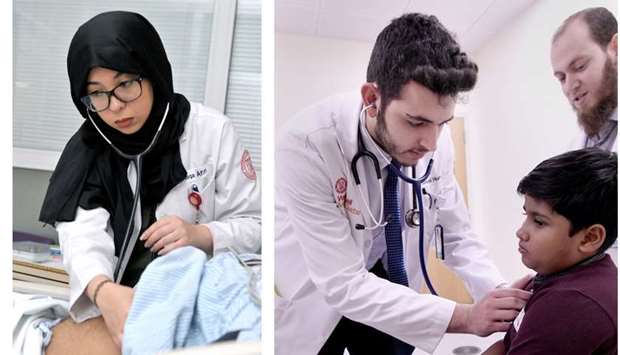A total of seven Weill Cornell Medicine-Qatar (WCM-Q) third-year medical students recently completed Qatar’s first university elective, called Infectious Disease Outbreak: A Public Health Response.
The elective was jointly organised by the Qatar Foundation partner university’s Institute of Population Health, along with the Ministry of Public Health (MoPH).
The course directors were Sheikh Dr Mohamed al-Thani, director of Public Health at the Ministry of Public Health, and associate professor of Healthcare Policy and Research at WCM-Q; Dr Ravinder Mamtani, WCM-Q’s professor of Healthcare Policy and Research, professor of medicine and vice dean, Student Affairs, Population Health, and Lifestyle Medicine; and Dr Sohaila Cheema, director of the Institute for Population Health and assistant professor, Healthcare Policy and Research at WCM-Q.
The month-long credited course – held at MoPH – gave them an in-depth view of the epidemiology of infectious diseases and epidemics, the characteristics, causes and investigations of outbreaks, and risk communication between stakeholders.
According to Toqa Afifi and Basel Humos, two of the WCM-Q medical students who completed the module, what sets this course apart was that they were in the “control room”, along with frontline public health specialists who were involved in monitoring and mitigating the pandemic’s spread in Qatar.
“It’s a bit like being in the eye of the storm,” says Afifi. “No matter what you read about epidemiology in text books, it’s something else to be involved in a program where you’re simultaneously learning about and observing an evolving health crisis – and applying what you learn.
“We were involved in monitoring data, contacting Covid-19 patients, tracing secondary contacts, arranging further intervention, and so on. No lecture can teach you this – you need to get knee-deep along with the others, to truly understand the efforts that go into keeping people – keeping a country – healthy. This is what studying medicine is all about.”
The course also reflects and respects the historical evolution of tried and tested methodology in studying infectious diseases. The basis of certain topics discussed in the elective – such as understanding the properties of infectious agents, contact tracing, surveillance, data assessment, route mapping and monitoring high-risk sections of the population – have not changed much. Yet, along with other fields such as communication and statistical analysis, their accuracy has been sharpened by technology.
“The basic fundamentals of tackling epidemics have remained almost the same across the years; what’s changed is the way technology has sped up and sharpened collection, analysis, and results,” Afifi explains.
“For instance, during the course, we used a digital platform – a data entry system – called Surveillance And Vaccination Electronic System. The system takes in all the data that we have collected from the field and generates epidemiological analysis. A few decades ago, this would have had to be worked out manually.”
“The Institute for Population Health has been conducting research in infectious diseases since it was established in 2017” says Dr Cheema. “Some of our recent research publications explored the incidence and management of Hepatitis C, public awareness of the Zika virus, and the relevance of gap mapping in epidemiology.”
“What people tend to forget is that healthcare itself originated from the need to keep a population healthy”, says Humos. “This pandemic has reminded everyone of that.
“As a medical student, it’s also highlighted the reason why public health is bookended in our curriculum; why it’s taught in our foundation year and then again, in our final year. There is a reason for that: it drives home the fact that, at the micro and macro level, the goal of medical care is public health – that it is the alpha and omega of preventing and treating diseases,” he added.

